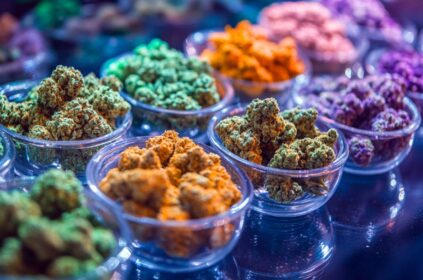Impact of Delta-8 on Traditional Cannabis Markets: A Comprehensive Guide
Introduction
The rise of delta-8 THC has stirred the pot, so to speak, within the cannabis industry. As more states grapple with the nuances of cannabis legalization, delta-8 has emerged as a significant yet complex player. It has created various ripples in traditional cannabis markets, influencing consumer choices, economic dynamics, and regulatory landscapes. This article aims to explore the multifaceted impact of delta-8 on traditional cannabis markets, providing clarity and understanding for those who are curious about this emerging cannabinoid.
What is Delta-8 THC?
Delta-8 THC, officially known as delta-8 tetrahydrocannabinol, is a cannabinoid that shares structural similarities with the more famous delta-9 THC—the primary psychoactive component of cannabis. While delta-8 does produce a euphoric effect, it tends to be less intense, leading many users to describe it as a smoother, more manageable high.
Originating from CBD, delta-8 is synthesized from hemp plants. This process often involves refining CBD through chemical means to yield delta-8 THC. The resulting products can be found in various forms, including edibles, tinctures, and vape cartridges.
Legal Ambiguity and Market Presence
The legal status of delta-8 THC is pivotal to its market presence. Following the passing of the 2018 Farm Bill, which federally legalized hemp and its derivatives, delta-8 emerged in a legal gray zone. The bill’s definition of THC specifically referenced delta-9 THC, leaving delta-8 unregulated in many states. This loophole enabled products containing delta-8 to flourish in markets where traditional cannabis remains illegal.
Consumers can find delta-8 products in various settings, from specialized dispensaries to convenience stores, which typically don’t carry products containing delta-9 THC. This accessibility is one reason for delta-8’s popularity, making it an attractive option for those seeking psychoactive experiences without navigating the complexities of traditional cannabis laws.
Impact on Traditional Cannabis Markets
Competition and Consumer Preference
The presence of delta-8 THC has reshaped consumer preferences significantly. Many individuals prefer delta-8 for its milder psychoactive effects, often citing a reduction in anxiety and paranoia compared to delta-9 THC. This makes delta-8 particularly appealing for those who may have had negative experiences with traditional cannabis.
The allure of delta-8 extends even to states where recreational cannabis is legal. Some consumers gravitate towards delta-8 products for a more manageable high, while others appreciate the novelty. The broader availability of delta-8 has created a new segment of the market where flexibility and choice reign.
Economic and Production Implications
The economics of delta-8 THC present both opportunities and challenges for traditional cannabis markets. Delta-8 products usually come with lower production costs and fewer regulatory hurdles compared to traditional cannabis. As a result, the price point for consumers can be appealing, especially for those on a budget.
Moreover, the market for delta-8 THC expands the landscape for hemp producers. Producers can convert excess CBD into delta-8, benefiting from the higher wholesale prices that delta-8 THC commands compared to standard CBD isolate. This added revenue stream could incentivize more hemp farmers to explore the production of delta-8 THC, thereby altering supply dynamics.
Regulatory Concerns and Safety
One of the most pressing issues surrounding delta-8 THC is safety, primarily due to its unregulated production in many markets. Unlike traditional cannabis, which undergoes stringent testing for potency and contaminants, delta-8 products often escape the same level of scrutiny. This lack of oversight raises concerns about:
- Harmful chemicals and byproducts
- Pesticide residues
- Residual solvents
- Mycotoxins
As a result, many industry experts and advocates are calling for stricter regulations to ensure delta-8 products meet safety standards similar to those applied to traditional cannabis. A push for third-party lab testing and clear labeling could help consumers make informed choices about the products they purchase.
Market Trends and Future Outlook
Coexistence with Traditional Cannabis
Interestingly, many stakeholders in the industry do not perceive delta-8 as a threat but rather as a complementary product. In states where recreational cannabis is illegal, delta-8 offers potential consumers a legal avenue to access psychoactive experiences. This coexistence may result in a more diverse product range, catering to varied consumer needs—whether they seek the potency of delta-9 THC or the milder effects of delta-8 THC.
Regulatory Evolution
As the market for delta-8 continues to grow, so too does the likelihood of regulatory shifts. Authorities at both state and federal levels are beginning to scrutinize delta-8’s legality, with several states implementing new regulations around its sale and distribution. This evolution could pave the way for more stringent guidelines, akin to those that govern traditional cannabis products.
Market Expansion and Innovation
Delta-8 THC opens doors for innovation within the cannabis industry, particularly among CBD manufacturers looking to diversify their product offerings. As consumer interest grows, we can expect a surge of innovative products that incorporate delta-8, tailored to specific consumer demographics.
For instance, product developers may explore formulations that combine delta-8 with other cannabinoids, such as CBD or CBG, to create unique effects and enhanced experiences. This potential for product sophistication can provide consumers with a personalized approach to wellness and relaxation.
Conclusion
The impact of delta-8 THC on traditional cannabis markets is intricate and multifaceted. While it provides consumers with a milder alternative to delta-9 THC and fills a market void, it also brings forth important conversations about safety and regulation. As the cannabis landscape continues evolving, stakeholders—from producers to regulators—must prioritize consumer safety and informed choices.
Actionable Takeaways
- Advocating for regulatory clarity is essential to establishing safety standards for delta-8 products.
- Educating consumers about the differences between delta-8 and delta-9 THC can help mitigate potential risks associated with unregulated products.
- Exploring opportunities for market diversification can broaden consumer access to various cannabinoid experiences.
- Focusing on innovation will be key to creating products that meet consumer needs while ensuring safety remains a priority.
Navigating the challenges and opportunities presented by delta-8 THC will be crucial for the cannabis industry moving forward, ultimately enriching the market with diverse and safer choices for consumers.




















